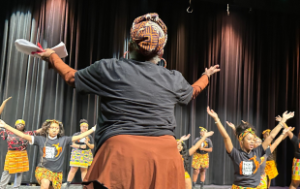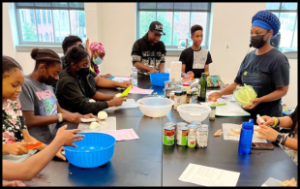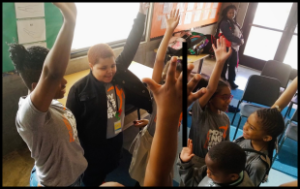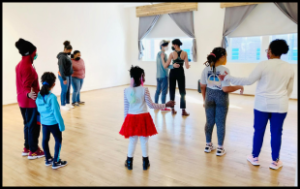
Breai Mason-Campbell watched as the teenager ladies at Mercy Excessive Faculty took selfies carrying lapas—colourful West African skirts worn in dancing—and headdresses. Her colleague, Amaniyea Payne, choreographed the highschool ladies in a bit about Frederick Douglass, after Mason-Campbell and Payne joined them in watching a documentary created by a Mercy alumnus and taking a look at previous images of him. (“This this man would have been a GQ mannequin, I’m telling you,” she says as an apart.)
“They’ve such a way of dignity, you understand, pleasure and pleasure about their very own tradition,” Mason-Campbell tells me.” There’s moments that, I’m similar to, ‘Oh, look, it really works.’”

Dignity and cultural reminiscence are key to Shifting Historical past, which Mason-Campbell initially based as a dance efficiency troupe below the identify Guardian Dance Firm. The group now payments itself as “Kinetic African American Historical past” and expanded the group’s work to have a broader and extra immersive focus to satisfy the mission of “instructing the story of African-American folks.” Together with dance, actions embody cooking African American delicacies, creating visible artwork, and enjoying instrumental and vocal music.
“I needed my neighborhood to have a higher measure of dignity,” a purpose that Mason-Campbell mentioned stemmed from reflection on private expertise. “I actually had a number of questions concerning the causes of poverty, like, the cycles of violence that I had been a celebration to rising up in Baltimore,” she says. “ I buried so many buddies in highschool. , it was such as you hear about it on the information. However like, I’m an actual particular person in a kind of tales.”
Mason-Campbell reveals that she misplaced her personal boyfriend to gun violence after her highschool commencement. She may identify somebody she knew who died for annually in highschool. “These weren’t individuals who had been distant buddies. It‘s was my group of buddies, like my walk-around, my go-to-the-basketball-court buddies, my hang-out-outside-and-talk buddies.”
She sought the solutions to those questions on root causes of violence and poverty in school and graduate faculty. Mason-Campbell earned a Bachelor’s levels in each Faith and Geography & City Research from Temple College in 1999. She then obtained her Grasp’s Diploma from Harvard Divinity Faculty with a spotlight in African American Social Ethics, with a thesis on Hip-Hop as a spiritual and ethical touchstone for African American youth.

“I began to study structural racism and structural oppressions.” Mason-Campbell outlines sixteen years of working in Sandtown after faculty. “Over the course of these years, the corporate was beginning to function even and not using a identify however I had come to correlate a way of dignity, a way of identification with a more healthy neighborhood.” Dialogue of race is linked to shallowness, posits Mason-Campbell. “However once we speak about race and shallowness, then it’s like, oh, that is political, you understand, we’re not having this dialog or no matter.”
Mason-Campbell compares what she tries to supply to Hebrew Faculty. She mentions she has buddies who’re all totally different branches of Judaism, or non-observant, however they’ve the shared expertise. “That depth of reference to historical past, of function and tradition, actually appears to do one thing buoyant for folks. And I needed my neighborhood to have that form of buoyancy, that sense of belonging, that sense of gravitas, of the significance of self and the significance of neighborhood and the significance of legacy.”
Mason-Campbell works instantly with college students, versus solely performing for them, as a result of “that’s the best way that data passes in our neighborhood.” She talks about household recipes. “This can be a critical factor round right here, the way you make the macaroni and cheese. It have to be part of reminiscence.”

Mason-Campbell labored with two college students for ten years, on the Lindy Hop, the 1928 dance. “Although it’s a dance from Harlem, it’s develop into tremendous dominated on the worldwide competitors stage by Sweden, as a result of Sweden had all this cash to come back and take our Lindy Hop greats and convey them over there to show,” she says. “And you understand, as a result of the best way Jim Crow labored right here, Lindy Hop wasn’t preserved.” She references Norma Miller and Frankie Manning, Black Lindy Hop dancers who didn’t attain the identical peak of fame as Astaire. “Fred Astaire can transfer to California and open a studio, proper? Two black dancers can’t do this. We, in truth, don’t even know their names due to Jim Crow.”
Mason-Campbell’s two college students would attend the worldwide Lindy Hop competitors yr after and lose to Swedish dancers. In 2019, she had the chance to ship them to Lindy Hop camp in Sweden. “We pushed and pushed and pushed,” she tells me. “They gained. First place. From first grade to twelfth grade is how lengthy it took. However we did it.”
Inequity clutches to each area, and the nonprofit sector shouldn’t be absolved. Nonprofit Finance Fund stories that forty-one % of white-led nonprofits obtained 50% or extra unrestricted funds in FY2021 as in comparison with 26% of BIPOC-led organizations. Mason-Campbell has to take care of one other job to assist her work with Shifting Historical past. “With training courses for teenagers, or, you understand, coaching for academics, or no matter we’re doing, communication with our supporters, on-line stuff, all of that stuff can’t occur with out funding.”

Mason-Campbell states that with out the $10,000 Strengthening the Humanities Funding in Nonprofits for Fairness (SHINE) grant from Maryland Humanities, she wouldn’t be capable to maintain two members of her workers aboard. Payne and Sonya Kumar function the group’s Arts Program Coordinator and Administrator, respectively. Mason-Campbell depends on Kumar to speak with supporters and full digital work. Payne—who additionally choreographed the Frederick Douglass piece—liaises with the websites the place Shifting Historical past performs and educates. “There simply wasn’t cash to pay folks,” Mason-Campbell says. “And me paying them out of pocket, which I’ve many times, it’s simply not sustainable. I’ve obtained three children, you understand?”
Mason-Campbell expresses a wave of reduction when she realized Shifting Historical past obtained the SHINE funding. “Realizing that I may pay payroll, and we’d have extra money left was a reduction as a result of generally we pay payroll, and that’s every part. After which I’m like biting my nails,” she confesses. “The truth that we pay payroll, after which there was nonetheless cash, which meant I may go into one other payroll with cash simply to pay workers? It’s like such a weight off my shoulders.”
Mason-Campbell locations Shifting Historical past within the panorama of Maryland, what she calls a “forerunner in pushing for social justice,” particularly within the nationwide local weather with ban on discussing race, gender, or sexuality within the classroom. “That is simply one other approach we will stand for justice,” she says. “Y’all may assume that you simply’re going to say, we don’t say race, or we don’t say homosexual, no matter else, you determined to attempt to silence folks about to attempt to create some form of actual false sense of homogeneity and preserve your energy construction the best way it exists,” she provides. “We’re saying, ‘No. We’re going to heart discussions about our cultural heritages. We’re going to heart these histories and the training of those cultures, their preservation, and their follow.’”
